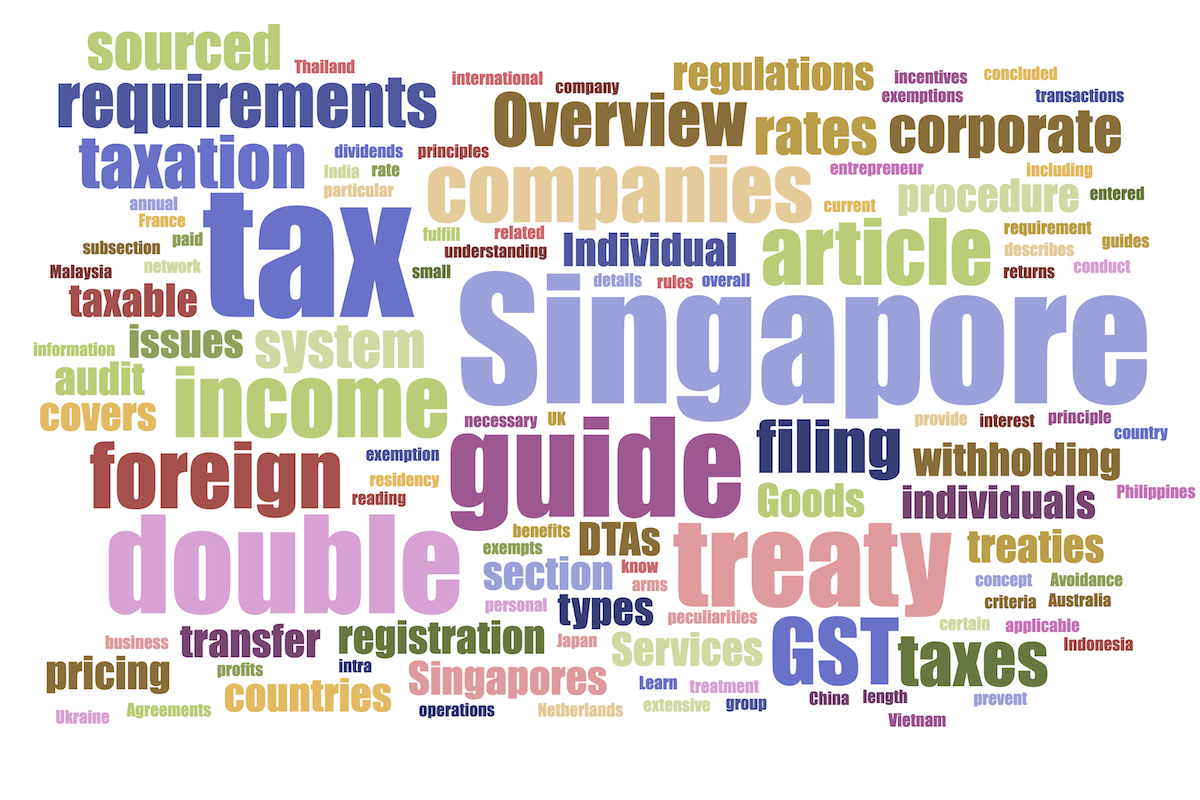Tax Residency of a Singapore Company
Introduction
How to Determine if Your Singapore Company Is a Tax Resident
Any Singapore-registered company can be either a tax resident or a non-resident of Singapore. This classification is not necessarily determined by a company’s place of incorporation, as it works in some other countries.
Under local tax laws, to be considered a Singapore tax resident, your company should be directly controlled and managed from Singapore. Conversely, a company is not treated as a tax resident when control and management is exercised outside of Singapore. This principle applies not only to Singapore-registered companies but to foreign entities as well.
In simple words, it means — all the strategic decisions on the company policies and activities should be made within Singapore (e.g. decisions on managing financial issues, controlling the company’s bank accounts, appointing of managerial positions, deciding on reorganization matters, and other essential business functions crucial to the running of the company). So, basically, you should consider the place where your company’s board of directors meetings are conducted.
Note that the company’s tax residency status is determined for a particular year of assessment (YA) and may change from year to year. A Singapore tax resident company may hold that status one year but not necessarily retain it in the next. For instance, a company can only be considered a Singapore tax resident for YA 2021 if its management decisions throughout 2020 were made directly from Singapore.
Also, bear in mind that the place where a company conducts its activities or operations is not necessarily where it is tax resident.
COVID-19 impact
In view of the disruption to international travel and business operations caused by the COVID-19 pandemic, conducting board of directors’ meetings in Singapore was not always possible due to the inability of some chief executive officers to enter the country. This situation raised concerns about whether it might affect the company’s tax residency status.
Following OECD guidelines, to support local businesses, the Inland Revenue Authority of Singapore (IRAS) has released a notice on the implications of the COVID-19 outbreak in terms of tax residency. It provides that a temporary change in location of the c-suite executives is an extraordinary and temporary situation caused by the COVID-19 crisis, and therefore should not affect the company’s residency for tax purposes.
The IRAS has made an exemption that allows companies to remain tax residents of Singapore, whether its directors were physically present in Singapore or not within the last two years. Under this exemption rule, IRAS will consider a company as a Singapore tax resident for YA 2021 and 2022, provided the following conditions are met:
- The company was a Singapore tax resident for the preceding YA.
- There are no other changes to the economic circumstances of the company (i.e. the principal activities and business model of the company, the nature of the business operations, the place where business is conducted, and the usual locations in which the company operates).
- The directors of the company must attend Board of Directors meetings that are held outside of Singapore or online meetings (if held through video or teleconferencing). This option is allowed only if the directors are temporarily unable to travel to Singapore as a consequence of COVID-19 travel bans.
Note that this exemption may no longer be valid after border restrictions are lifted. So it would be good to arrange for your company directors’ travel to Singapore as soon as possible (if they reside overseas) to retain the company’s tax residency status.
As each country has its own COVID-related regulations, there might be situations that trigger an issue with the company’s dual residency. For example, in some cases, a temporary change of the place from where the company is controlled and managed may result in a situation where the company is considered resident in two countries simultaneously under their domestic laws. But as long as your country is among the list of countries that signed a Double Taxation Agreement (DTA) with Singapore, there is nothing to worry about, as the DTA prescribes specific rules ensuring that the entity is resident in one state only.
How Your Company Can Benefit From Being a Singapore Tax Resident
Generally, Singapore tax resident and non-resident companies are taxed in the same way (i.e. at a flat tax rate that is capped at 17%). However, usually, tax residency can directly affect your company’s corporate income tax. For instance, having secured a status of a Singapore resident company for tax purposes, your company can take advantage of certain benefits, such as:
- Qualifying for tax allowances, grants, and loans under Singapore business support programs, such as the Tax Exemption Scheme for New Start-Up Companies (where one of the main criteria is tax residency).
- Enjoying tax exemptions on qualified foreign-sourced service income, foreign branch profits, and foreign-sourced dividends.
- Saving your company from additional taxation in a foreign jurisdiction. You can reduce tax due significantly or even to zero on qualified income that was already taxed in Singapore in a foreign jurisdiction that concluded a DTA with Singapore.
- Reducing your tax liability in Singapore by deducting taxes already paid in a foreign jurisdiction.
Taxable companies by resident type and chargeable income
Important to note:
- Only Singapore tax resident companies (whether registered in Singapore or not) can enjoy benefits under the DTA.
- Some of the above benefits can be claimed via the company’s domestic tax return filed with IRAS, whereas if you want to claim any tax benefits under a DTA, it’s often necessary to provide evidence of tax residency to the relevant tax authority of the treaty jurisdiction. This evidence is usually provided in the form of an official Certificate of Residence issued by the tax authority.
- Different DTAs provide different benefits and have different requirements to satisfy, which are often quite complicated. Given the considerable penalties that can be imposed for failing to pay taxes in certain jurisdictions, it would be prudent to conduct proper research or seek professional advice from reliable tax consultants to ensure that all required documentation is prepared on time and that there will be no penalties or business disruptions. This could save you money in the long run and offer peace of mind.
Certificate of Residence
A Certificate of Residence (COR) is an official document that proves that your company is a tax resident in Singapore. It is a powerful document that lets you take advantage of Singapore's DTAs by claiming tax deductions in foreign jurisdictions with which Singapore signed an agreement. Here you can find a sample of a COR.
Not every company needs to apply for a COR and can actually benefit from it. But it can help you save money in the long run. As a business owner, having a COR may allow you to broaden your business without having to worry too much about taxes
This is especially the case when your company receives foreign income that may be also subject to tax in a foreign jurisdiction under the local laws. With the DTA in place, you can claim certain tax reliefs prescribed under the DTA. For these purposes, foreign tax authorities may require a document that certifies that the company is a tax resident of Singapore, i.e. a Certificate of Residence.
Keep in mind that tax residency is not permanent and the certificate can be awarded on a year-to-year basis. That means you could enjoy DTA tax exemptions as a tax resident in one year, and then become a non-resident in the subsequent year.
Who is eligible for a Certificate of Residence?
As not all companies can apply for a COR, before submitting an application make sure your company is one of the following eligible entities:
- A Singapore-registered company that is able to satisfy the above-mentioned requirements to be regarded as a tax resident of Singapore and provide the supporting documentation to justify it.
- A foreign-owned investment holding company (i.e. 50% or more shares of which are held by foreign companies incorporated outside Singapore or individuals who are not citizens of Singapore) with purely passive sources of income and which is receiving only foreign-sourced income, if it can show that:
- The control and management of the company's business is exercised in Singapore (i.e. board of directors’ meetings are held in Singapore). IRAS may require you to demonstrate that decisions on strategic matters are made in Singapore.
- It has valid reasons for setting up an office in Singapore.
- The company has related companies in Singapore that are tax residents of Singapore or have business activities in Singapore; and
- Receive support or administrative services from a related company in Singapore.
- It has at least one director based in Singapore who holds an executive position (not a nominee director) OR has at least one key employee based in Singapore.
- A non-Singapore incorporated company (including branches of foreign companies, as they are controlled and managed by their overseas parent company), if it can show that:
- The control and management of the company's business is exercised in Singapore (i.e. the Singapore branch is exercising the full control and management of the company).
- The company has valid reasons for not incorporating in Singapore.
How to apply for a Certificate of Residence
To obtain a COR, you can submit an application to IRAS on myTax Portal. The document can be issued for the current calendar year or even up to four preceding calendar years.
When applying for a COR, IRAS will ask you to provide your company’s credentials, such as: the company’s full name, registration number, YA for which the COR is required. The detailed step-by-step instructions on how to apply for a COR are provided in this guide.
The processing time is around 7 working days. Once your application is processed, you will receive a digital copy of the approved COR on the myTax Portal.
If your company is not registered in Singapore, IRAS will process the application within 14 working days.

"I have had a superb experience with your team. The whole incorporation process was coordinated very skillfully and managed very well. Besides, I am truly impressed with your user-friendly yet sophisticated online platform."Matthew Hall, VP of Finance, O3 Insight Inc.
In this case, you should apply for a COR via email, providing IRAS with the following information:
- Company name and Unique Entity Number;
- Reason for requesting a COR;
- The calendar year for which a COR is required;
- Name of DTA country where a COR will be presented;
- Nature and amount of income to be derived from the DTA country;
- Name of the foreign company or person paying the relevant income;
- Date of remittance of income;
- A document confirming that the control and management of the business of the company for the whole of the calendar year is exercised in Singapore (e.g. board minutes).
IRAS may also request any additional information at its discretion.
Useful Tips
If you are eager to take advantage of Singapore tax-friendly policies as many other successful entrepreneurs, here are some tips on how to preserve Singapore tax resident status for your company:
- Plan to arrange as many board of directors meetings in Singapore as possible.
- Be ready to prove that some key decisions for your business were made during these meetings.
- Make sure to keep all relevant documentation and records (e.g. board minutes noting the location, name of attendees, a detailed description of the substantive matters that were discussed), especially when conducting such meetings by electronic means, as IRAS may request you to provide this information.
- Your company’s directors’ residential position may also play an important role.
- The physical location of your company’s books and records is also important.
All of the above factors, as well as other ancillary issues, must be taken into account when declaring how and where the company's control and management is exercised when filing an annual resident income tax return in Singapore. For the tax resident status to remain legitimate, the company must give clear evidence that control and management was indeed exercised in Singapore for the relevant year, especially in a new pandemic reality.
Final Thoughts
The ongoing COVID-19 crisis has highlighted the significance of having a well-thought-out business plan. While Singapore tax residency may not be on the top of your list, the consequences of failing to secure a status of Singapore tax resident could be considerable for your cross-border business. This is especially true if you are wishing to benefit from local tax relief programs or through Singapore's network of DTAs. So, take the time to think about what can be done to ensure that your company will remain eligible to exploit these opportunities.
Our team of dedicated consultants can help you take advantage of Singapore’s low-tax regime, assist with tax compliance issues, apply for tax incentives, or obtain a COR for your company to claim DTA deductions. Contact us if you require our assistance.
FAQs
Eddy and Hannah
Your Customer Service Team
Work with a team that reflects Singapore's tradition of excellence in diversity. We speak many languages, come from different backgrounds, but we share one goal — your success in Singapore!
Tiffany
Nadia
Tonya
Fenni
Elena
Haly
Sandy
Mithun
Qid
Vika
Patricia
Benny
Jessica
Lingna


